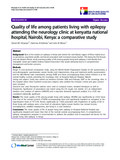Quality of life among patients living with epilepsy attending the neurology clinic at kenyatta national hospital, Nairobi, Kenya: a comparative study

Date
2013-06-18Author
Kinyanjui, Daniel WC
Kathuku, Dammas M
Mburu, John M
Type
Journal ArticleMetadata
Show full item recordAbstract
Abstract
Background
Most of the studies on epilepsy in Kenya and indeed the sub-Saharan region of Africa mainly focus on prevalence, psychiatric profile, and factors associated with increased seizure burden. This being the first Kenyan and sub-Saharan African study assessing quality of life among people living with epilepsy, it will identify their ‘intangible’ needs and enable evidence-based intervention that would ultimately lead to a comprehensive management and better outcome.
Methods
Design: A cross-sectional comparative study, using the World Health Organization Quality of Life questionnaire, a socio-demographic questionnaire, seizure burden and characteristics, drug and treatment profile questionnaires and the Mini-Mental state examination, among PLWE and those accompanying them, herein referred to as the normal healthy controls, attending the neurology clinic at Kenyatta National Hospital, Nairobi.
Setting and subjects: Study was carried out between October 2006 and February 2007 at the neurology clinic in the hospital where three hundred consecutive subjects who satisfied the inclusion criteria and gave consent were recruited.
Statistical tests used: Descriptive statistics were used to compute means, standard deviations as well as frequencies. Significance of associations was tested using the Chi square test statistic (x2), an independent samples t-test, analysis of variance (ANOVA) and a step-wise (forward) regression analysis. A p < 0.05 was considered statistically significant.
Results
The mean quality of life among people living with epilepsy (49.90%) was significantly (p < 0.01) lower than that of the normal controls (77.60%) accompanying them and significantly impaired as compared to the hypothesized mean of 75±2.5%. Factors significantly (p < 0.05) associated with impairment of quality of life in those living with epilepsy were a low level of education, higher seizure burden, low annual income, unemployment, unskilled employment, and living in a rural residence.
Conclusions
The mean quality of life of people living with epilepsy at Kenyatta National Hospital was significantly impaired and lower than that of the normal controls accompanying them. A comprehensive epilepsy management program is recommended to address this problem and its associated risk factors for the people living with epilepsy in Kenya.
URI
http://dx.doi.org/10.1186/1477-7525-11-98http://erepository.uonbi.ac.ke:8080/xmlui/handle/123456789/37763
